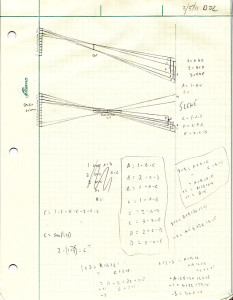Self-serving opinions are not always wrong
September 30th, 2013
Yes, everyone’s opinions tend to be self-serving.
That does not mean they are necessarily wrong. Some people may hold self-serving opinions that happen to be correct.
We must examine the validity of the arguments and data backing a viewpoint, not the motivation.
Smile economics – maybe Pope Francis is right
September 22nd, 2013
I read today that Pope Francis thinks the global economic system shouldn’t be based on “a god called money”, and that “Men and women have to be at the centre (of an economic system) as God wants, not money.”
Maybe he’s right. Our economic system should be about people – that’s who it is supposed to be for.
We should have an economic system that encourages people to help each other out, and voluntarily give one another the things they need. One that works without threats and coercion, and which makes people want to be nice and helpful to each other.
Here’s an idea I’ll call “smile economics” – it’s based on an economy of “smiles”:
Each time someone does something nice for a stranger (helps them out, gives them something they need, etc.), that person should give “smiles” in return – to show their appreciation of the nice thing. It might be a lot of “smiles”, or just a few, depending on how big the favor was.
(This would be mostly for use with strangers – people tend to be naturally nice to their friends and relatives.)
The people who accumulate lots of “smiles” would be those who are especially nice and helpful to others. Of course most people want to be perceived as nice, so wanting to have lots of “smiles” would act as a social incentive to encourage everyone to be nice to each other.
Now, when someone really wants a lot of help or something from other people, they could offer a lot of “smiles” for that help. Other people would know that they can really help someone a lot, if that person is offering a lot of “smiles” for the help. Because people want “smiles”, and everyone would know that others wouldn’t offer to give away many “smiles” unless they really wanted the help very much.
Here is the best part – even people who are not naturally nice – selfish people – would want to be nice, in order to get “smiles”.
Why? It’s true that nasty people often don’t care what people think about them. But in order to get help and other things they want from strangers, they’d need to offer “smiles”. Probably they’d have to offer even more “smiles” than nice people, because people don’t generally want to help nasty people. So, in the “smile economy”, nasty people would have to to be nice to others, in order to get the “smiles” they need to get the things they selfishly want for themselves. (Because, in this system, they can’t just buy what they want with money – they need “smiles”.)
“Smile economics” actually makes nasty people want to act nice, in order to satisfy their own selfish desires. It actually makes their own selfish interest drive them to be nice to other people! How about that!?
Of course, to do the most good, the system should be utterly universal and work between strangers of all races, religions, and nations, no matter where they are. We want to encourage people to be nice to one another no matter who they are. Anyone who said, for example, that someone in Brazil shouldn’t do nice things for someone in China (or any other pair of countries) would be seen as evil – because wanting people not to be nice to each other is evil. Nobody should ever tell anyone not to be nice to one another.
What do you think?
Addendum – A few people who have read this think it won’t work because people can just make fake “smiles” all the the time (as many as they want) in order to get things. They have a point. So let’s say that everybody gets a certain limited number of “smiles” to spend – maybe eight or ten each day (they can save them as long as they like).
Addendum #2 – In case it still isn’t clear, it doesn’t need to be “smiles” that people give as a reward. It could be anything that’s limited in number which other people value – for example pretty marbles (if they’re hard to get), or shiny rocks, or little pieces of gold. Or what the Spanish used to call “pesos de ocho” (pieces of eight). Or Greek drachma, Pakistani rupees, or Thai baht. Japanese Yen would work. Or Bitcoins. I suppose those all have their pros and cons, but it doesn’t really matter.
You get the idea now, I’m sure. Pope Francis is going to love this idea!!
Nobody expects the Spanish Inquisition NSA
June 14th, 2013
This turn of events I did not expect. Perhaps I should have.
Barack Obama who, famously, received the Nobel Peace Prize for not being George Bush…turns out to be George Bush, after all!
Will the Nobel committee ever recover from the ignominy?
I invented many common & important technologies
April 15th, 2013
Did you know I invented many of the key technologies used to drive today’s world?
It’s true – I did. All by myself. I ran across this yesterday:
It’s a 2011 scribble from when I was inventing deconvolution.
In fact I’ve invented so many common technologies that I’ve forgotten about most of them. A few that I do remember are:
| Technology | Concept | Implementation | Notes |
|---|---|---|---|
| Dither | ~1974 | – | As a child playing with circuits. |
| FIFO queues | 1978 | 1978 | I called them “circular buffers”; never heard of terms “FIFO” or “queue”. |
| Remote Desktop[1] | ~1980 | – | I was going to do it for the TRS-80 (Models I and III) and call it “Guest/Host”. |
| Web prefetch | ~1984 | – | Well, prefetch for web-like services, anyway. Pre-fetch the results from each of the 6 or so menu options on CompuServe Information Service (CIS), to save download time on your 300 bps modem. |
| Key splitting | ~1990 | – | Split a key into N parts, of which M (M <= N) are needed to use the key. |
| Google Earth | 1990 | 1991 | I started a company to do it. We were going to use CD-ROMs, because they hold so much data. Sigh. |
| Internet-controlled thermostat | 1997 | – | From my notes: “Thermostat with Internet interface so you can remotely set and test (and read history?) via Internet (or POTS); for travelers.” |
| Superresolution | ~1999 | – | Motivated by early digicams with lenses that could resolve more detail than the sensors of the time. |
| Deconvolution | ~1999 | 2011 | For lensless imaging. Dropped it when I discovered it required far more bits of ADC than available in real sensors (or even real photons). |
| Camera orientation sensor | ~2001 | – | Gravity sensor in digital camera detects if it’s being held in landscape or portrait orientation, then sets a bit in the image to display it properly. |
Of course, I don’t claim to have been the first to invent any of these things.
The astute reader will note that all these invention dates are all long after these technologies were already well-known. That’s because I re-invented them independently (having never heard of them). The chance to do that is one of the perks of having little formal education.
I’ve often thought that more than 99% of what any individual learns during a lifetime is lost when they die – only the tiny fraction of 1% that gets written down, successfully taught, or copied, benefits anyone else. It’s a terrible waste.
And this shows that even for that tiny fraction of 1% that is written down, many people (perhaps most?) end up having to re-discover it from scratch, either because that’s easier than understanding someone else’s explanation, or because it’s too hard to find out that someone else already has solved the problem.
Makes you think a bit about the meaning of “obvious at the time the invention was made to a person having ordinary skill in the art“, doesn’t it?
[1] I did have a little bit to do with inventing RDP (the first invention, that is), but that wasn’t till the 1990s…
Perhaps it had to come to this…
December 18th, 2012
From Techdirt, 2012-12-17:
China Tries To Block Encrypted Traffic
from the collapsing-the-tunnels deptDuring the SOPA fight, at one point, we brought up the fact that increases in encryption were going to make most of the bill meaningless and ineffective in the long run, someone closely involved in trying to make SOPA a reality said that this wasn’t a problem because the next bill he was working on is one that would ban encryption. This, of course, was pure bluster and hyperbole from someone who was apparently both unfamiliar with the history of fights over encryption in the US, the value and importance of encryption for all sorts of important internet activities (hello online banking!), as well as the simple fact that “banning” encryption isn’t quite as easy as you might think. Still, for a guide on one attempt, that individual might want to take a look over at China, where VPN usage has become quite common to get around the Great Firewall. In response, it appears that some ISPs are now looking to block traffic that they believe is going through encrypted means.
A number of companies providing “virtual private network” (VPN) services to users in China say the new system is able to “learn, discover and block” the encrypted communications methods used by a number of different VPN systems.
China Unicom, one of the biggest telecoms providers in the country, is now killing connections where a VPN is detected, according to one company with a number of users in China.
This is the culmination of at least 35 years of official concern about the effects of personal computers.
I’m old enough to remember. As soon as computers became affordable to individuals in the late 1970s there was talk about “licensing” computer users. Talking Heads even wrote a song about it (Life During Wartime).
The good guys won, the bad guys lost.
Then, even before the Web, we had the Clipper chip. The EFF was created in response. And again the good guys won.
Then we had the CDA, and then CDA2. And again, the bad guys lost and the lovers of liberty won.
In the West, the war is mostly over (yet eternal vigilance remains the price of liberty).
Not so in the rest of the world, as last week’s ITU conference in Dubai demonstrated.
I say – let them try it. Let them lock down all the VPNs, shut off all the traffic they can’t parse. Let’s have the knock-down, drag-out fight between the hackers and the suits.
Stewart Brand was right. Information wants to be free. I know math. I know about steganography. I know about economics.
I know who will win.
Photos from an airplane window
November 14th, 2012
Back in November 2011 I was flying from San Francisco to Boston, and saw this out the airplane window:
That’s Manhattan and greater New York.
I grabbed my camera (a rather ordinary Canon G11) and started snapping. Here are the best (click on any pic for full size):
These are all un-retouched JPEGs, straight of of the camera. Amazing.
I just made a little animated GIF out of a few later pix:
Questions are more valuable than answers
October 24th, 2012
…at least if you’re Google.

The interesting site Terms of Service; Didn’t Read gives Google a thumbs-down because “Google can use your content for all their existing and future services”.
I don’t think a thumbs-down is really fair here – I mean, that’s the whole point of Google.
Google is a service that gives out free answers in exchange for valuable questions.
Answers are worthless to Google (though not to you) because Google already knows those answers. But it doesn’t know your questions. So the questions are valuable (to Google, not to you). Because Google learns something from every question.
When you start typing a search into Google and it suggests searches based on what other people have searched for, that’s using your private information (your search history) to help other people. They’re not giving away any of your personal information (nobody but Google knows what you searched for or when), but they are using your information.
Google gets lots of useful information from the questions that people ask it. It uses that information to offer valuable services (like search suggestions) to other people (and to you), that they make money from (mostly by selling advertising).
That’s not a bad thing. It’s the only way to do many of the amazing, useful, and free things that Google does. I’m perfectly fine with it, but you have to more-or-less trust Google to stick to their promise to keep your private info private.
I think Google does a lot more of this than most people suspect.
When you’re driving and using Google Map to navigate, you’re getting free maps and directions. But Google is getting real-time data from you about how much traffic is on that road, and how fast it’s moving.
When you search for information on flu symptoms, Google learns something about flu trends in your area.
Sometimes I ask Google a question using voice recognition and it doesn’t understand. After a couple of tries, I type in the query. I’ve just taught Google what I was saying – next time it’s much more likely to understand.
When you use GMail, Google learns about patterns of world commerce and communication, who is connected to who, who is awake at what time of day, etc. Even if it doesn’t read the contents of the mail.
When you search for a product, Google learns about demand in that market, by location and time of day and demographics (it knows a lot about you and your other interests).
Google learns from our questions – answers are the price Google pays for them.
The universe is not parsimonius
October 21st, 2012
One of the defining characteristics of the universe is that it is not parsimonious.
Consider that fish produce many thousands of offspring to replace themselves once – all but two don’t make it to reproduction.
Consider evolution.
Consider the proportion of the Earth’s mass that participates in the biosphere. Of the solar system’s mass. Of the galaxy’s mass.
Consider the number of planets in the universe, and the number that have people on them (~ one).
Consider the proportion of the universe’s mass that is even matter. And the proportion of matter that has an atomic number greater than two.
Now consider the Many Worlds interpretation of quantum mechanics.
The universe is not parsimonious.
[This is not to disparage Occam’s Razor. Parsimony in explanation is indispensable. But the thing being explained need not itself be parsimonious.]
What is this strange feeling?
August 11th, 2010
It’s the sunburn. It’ll go away in a few days. Probably.
About democracy
January 22nd, 2010
Date: Fri, 22 Jan 2010 11:15:21 -0500
To: letters [at] economist.com
From: Dave <dave [at] mugwumpery.com>
Subject: Democracy’s decline – Crying for freedom (16 January)
Dear Sir –
About democracy (16 January) – you are quite wrong. The one and only merit of democracy is that it allows the people to replace malign governments without bloodshed. But this is no minor advantage – it offers the only long-term protection of personal freedom mankind has yet discovered.
The challenge is to preserve democracy while avoiding rent-seeking and pandering to organized groups seeking to benefit their own members at the public’s expense – necessary preconditions to winning electoral office.
Nobel laureate F.A. Hayek identified the core flaw of parliamentary democracy in the confusion between law in the traditional sense (rules governing interactions between people) and the running of government (budgets, taxation, etc.) and proposed separation of these powers. (In his Law, Legislation and Liberty, particularly Volume 3, “The Political Order of a Free People”– University of Chicago Press, 1979.) Those who wish to promote and improve democracy would do well to start with Hayek’s work.




